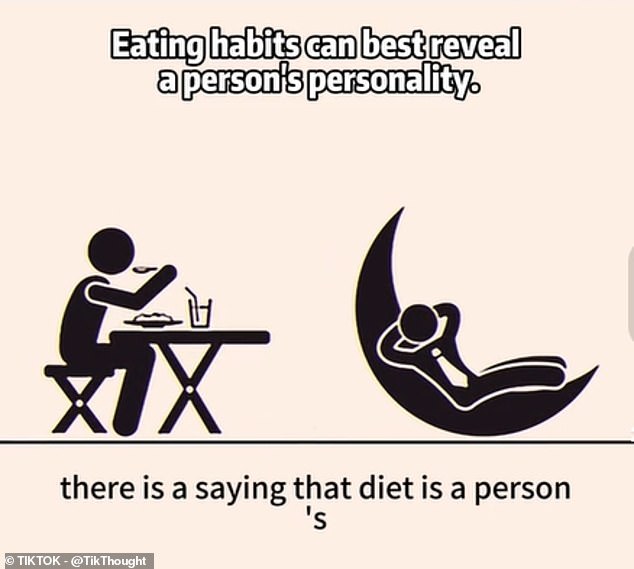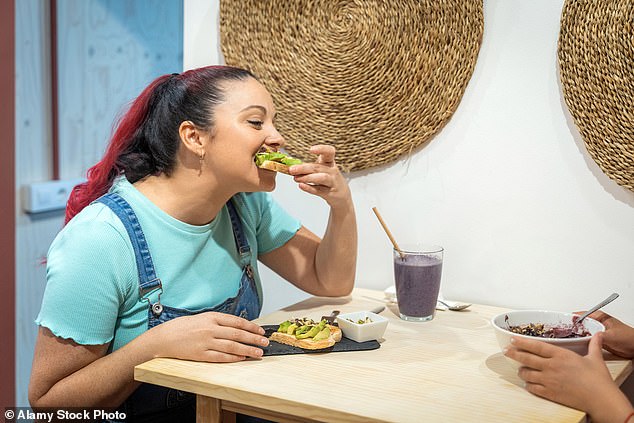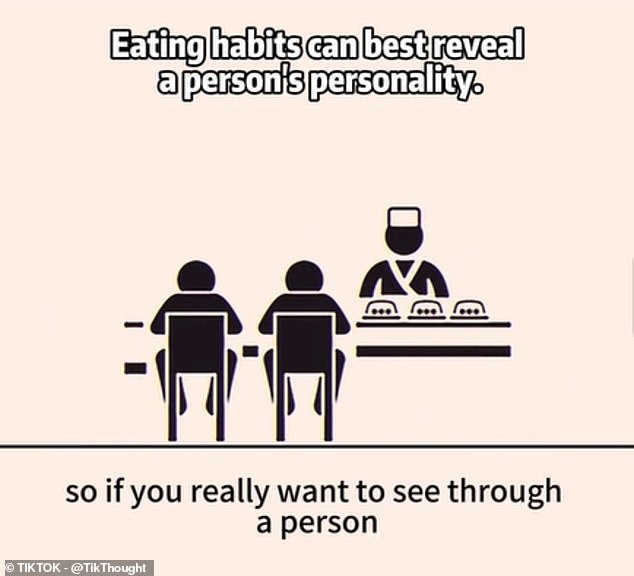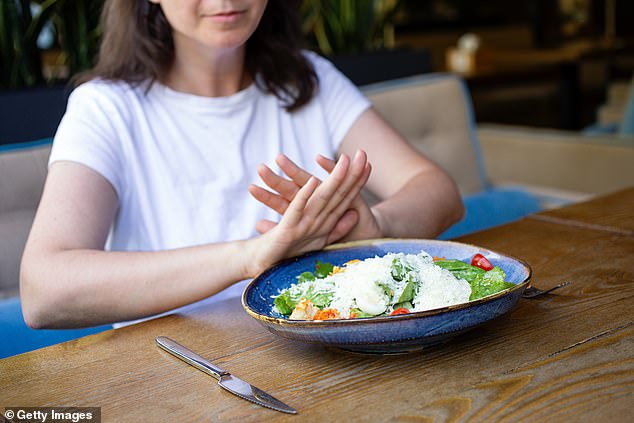It’s not what you eat, but how you eat it according to psychologists who claim that how you consume your meals speaks volumes about your personality.
According to some experts, the speed, method and style of munching can indicate key details about an individual’s character – such as whether someone is afraid of making mistakes or is worried about food scarcity.
Revealing the secret behind how personality can be connected to eating, a social media account, TikThought, shared what the different approaches could denote about the inner workings of your mind.
‘In psychology, there is a saying that diet is a person’s unconscious understanding of themselves,’ the video began.
‘So if you really want to see through a person, you should pay attention to the details that can’t be hidden when they’re eating.’
Indeed, Juliet Boghossian, a Los Angeles-based behavioural expert believes this to be the case, telling HuffPost that food-related habits ‘absolutely’ can sketch out a person’s ‘idiosyncrasies and rituals.’
So, whether you eat slowly, refuse to mix different foods, or slurp your soup, your eating habits apparently offer great insight into your character.
Read on to explore what your eating habits really say about your personality, according the experts…

Revealing the secret behind how personality can be connected to eating, a social media account, TikThought, has shared what the different approaches denote about their inner workings of our minds
SLOW EATERS
While some might think slow eaters simply know how to enjoy a meal, psychology dictates that this could point to someone who doesn’t like rushing, and who is ‘afraid of making mistakes.’
‘Some people eat extremely slowly, they can’t swallow the food until they chew it into tiny pieces,’ the TikTok clip pointed out.
Writing in LittleThings, another expert, Phil Mutz, compiled a list of nine of the most popular ways to consume food, revealing what they reflect about about a person’s personality.
He suggested that slow eaters ‘know how to appreciate life’ and tend to be more confident.
Shining a light on their less positive attributes, Mutz said slow eaters can be stubborn and rigid when it comes to their routines.
FAST EATERS
Some will eat their dinner at lightning speed, an indication that they fear their food will be snatched, suggested the experts.

There are also eaters choose to savour the tastiest morsels of their meal till last. Those people can be matched to the ‘peak-end theory’, which in psychology refers to those who prefer for their final impression of something to be positive (stock photo)
‘Some people gobble up their food. They are so afraid that the last bite of food will be taken away from them. In fact, they have never truly felt secure inside,’ the video said.
Boghossian, meanwhile, said that the speed to which one eats also ‘reveals the speed at which you take on and enjoy life.’
Fast eaters are also typically great at multitasking and meeting deadlines, and unlike their slower counterparts, are more likely to put other things and people ahead of themselves.
According to Mutz, they also make great partners because of their giving nature; many fast eaters don’t take enough time for themselves or focus on their own needs as often, which can turn out to be an issue in the long wrong.
PICKY EATERS
Every family has one – picky eaters are often accused of being the bane of a dinner party and can prove impossible to satisfy at the best of times.
The video explained that this is a trait that is rooted in fear of the unknown. ‘Some people are always picky eaters. On the surface, they seem willful and demanding but in fact, they are just afraid to face unfamiliar things,’ the video explained.
Julia Hormes, a psychologist specialising in food behaviour, pointed to research that showed reluctance to enter unchartered food territory can be linked to traits of ‘sensation seeking, anxiety, and neuroticism’.

According to some psychologists, the speed, method and style of munching can indicate key details about an individual’s personality – such whether someone is afraid of making mistakes, or is worried about food scarcity
Though it’s not necessarily an opinion held by all those in the field of psychology. Mutz took a more favourable view, saying picker eaters are often comfortable with who they are and what they want.
Picky eaters are curious people who crave knowledge and have no problems asking questions if it helps them stay in their comfort zone, he said.
SAVE THE BEST ‘TIL LAST
There are also eaters who choose to savour the tastiest morsels of their meal till last. Those people can be matched to the ‘peak-end theory’, which in psychology refers to those who prefer for their final impression of something to be positive.
The video said: ‘There are also some people who always like to save their favourite dish for last.’
What this means about a person, is that they are clued up on how to seek out the best experience.
‘This is because they have been used to waiting since they were young. But when they grow up, they forget how to strive for what they want,’ the video said.
‘If you want to see through a person, the simplest way is to keep observing them while they are eating.’

The video explained that this is a trait that is rooted in fear of the unknown. ‘Some people are always picky eaters. On the surface, they seem willful and demanding but in fact, they are just afraid to face unfamiliar things,’ the video explained. Stock photo
Equally, saving the best part of a meal until the last minute builds anticipation and allows eaters to establish a sense of control over their experience, which in turn making the final bite more rewarding.
It is also indication of a person who likes to ‘organise’ and separate the different foods on their plate.
This can be indication of someone who craves order in their life, and struggles to be flexible. While they are great at keeping their houses and desks tidy, they have trouble letting others share the responsibilities because they like things done a certain way, according to Mutz.












